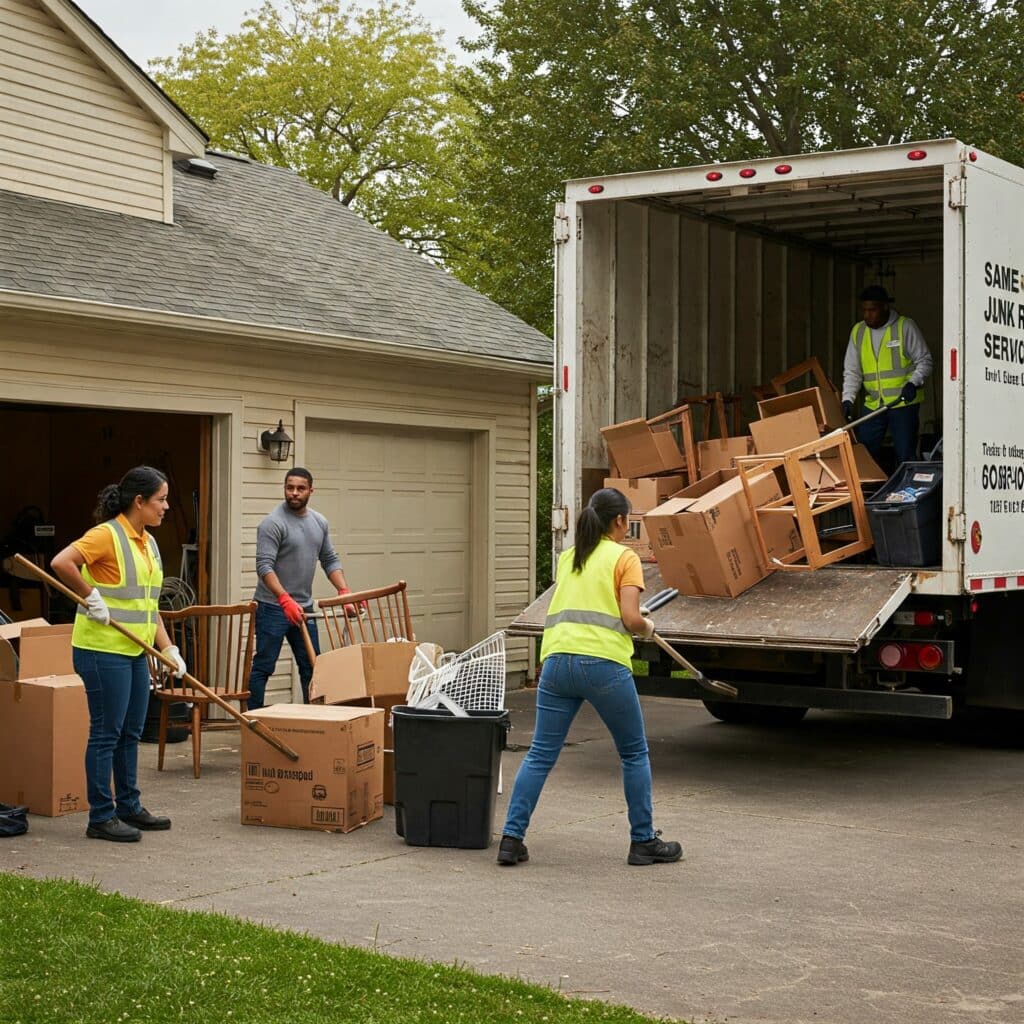Household hazardous materials, from old paint and pesticides to batteries and solvents, can harm people and the environment if disposed of incorrectly. Winnipeg homeowners need clear, local guidance on hazardous waste disposal Winnipeg so they can protect family members, sanitation workers, and the community.
This guide explains what hazardous waste is, how to identify it at home, Winnipeg’s local disposal routes (including 4R depots and municipal facilities), provincial stewardship programs, safe handling and storage, and when to call a professional. It also shows how Mr. Garbage can help homeowners coordinate compliant pickups and documentation. Short sections and clear steps make this easy to follow when you’re standing over a garage full of old cans.
What is hazardous waste disposal?
- leftover paints, solvents, and stain removers,
- pesticides and herbicides,
- automotive fluids and motor oils,
- batteries (single-use and rechargeable),
- certain cleaners and pool chemicals, and
- fluorescent tubes and some lighting fixtures.
Why proper hazardous waste disposal matters
- Health and safety: Household hazardous products can cause fires, chemical burns, or toxic exposures if stored or mixed incorrectly. Waste workers can be injured by unknown containers in regular trash streams.
- Environmental risk: Flushing liquids or dumping chemicals can introduce contaminants into groundwater, storm systems, and local waterways.
- Regulatory issues: Provincial and federal rules govern hazardous wastes; using approved collection channels keeps homeowners compliant.
- Economic cost to the community: Contaminated sites are costly to remediate and damage local ecosystems.
How Winnipeg handles hazardous waste: local routes and facilities
4R Winnipeg Depots & Brady Road
Provincial stewardship programs
Licensed hazardous-waste contractors
Common household hazardous items and how to treat them
Paints, solvents, and stains
- Keep containers upright and sealed.
- Use leftover usable paint for touch-ups or donate through community paint-exchange programs when available.
- Empty paint cans (fully dried) may be accepted in municipal recycling streams; partially full cans should go to a 4R depot or stewardship collection point.
Pesticides, herbicides, and garden chemicals
- Store in original containers with labels intact.
- Never pour them down storm drains or into the soil.
- Take them to designated drop-off sites or collection events run under stewardship programs.
Batteries and electronics
- Remove batteries from devices when storing or transporting.
- Recycle single-use and rechargeable batteries at depot drop-off points or retailer collection bins.
- E-waste (computers, TVs, printers) should go to approved e-waste processors or 4R depots; never place them in curbside recycling.
Automotive and workshop fluids
- Store oil, antifreeze, and solvents in clearly labelled, sealed containers.
- Take them to municipal depots or licensed processors — they need specialized handling to avoid environmental harm.
Fluorescent tubes and mercury-containing items
- Handle carefully; breakage releases mercury vapor.
- Bring these items to depots or program drop-offs designed to accept mercury-containing products.
Preparing hazardous waste safely at home
- Keep materials in original containers whenever possible and ensure lids are secure.
- Label unknown containers if you’re transferring contents to a secondary bottle. Clear labeling helps depot staff route materials correctly.
- Store items upright in a cool, dry place away from children and pets until disposal.
- Never mix chemicals — combining products can create dangerous reactions or fires.
- Tape leaking caps and double-bag any liquids to prevent spills.
Seasonal and special-collection events
- Community collection days sometimes accept materials not handled at regular depot locations.
- Paint and lightbulb exchange events can be organized through stewardship groups and Product Care collection sites.
- Pharmacy medication take-back days help remove expired or unused pharmaceuticals safely from the household stream.
Real-world example: Safe disposal after a garage cleanout
- They separated items into sealed, original containers and set aside items with clear labels.
- Usable solvents were given to a neighbour who had immediate use; other items were taken to a 4R depot that accepted workshop chemicals.
- For older mercury-containing lighting found in a box, the homeowner used a stewardship drop-off arranged through the municipal depot.
When to call a professional hazardous waste disposal service
- Large volumes from renovations or hoarding situations.
- Leaking or unstable containers that risk spills.
- Contaminated soil or property requiring remediation.
- Commercial/industrial-type wastes generated at home workshops beyond household quantities.
Legal and regulatory framework: what homeowners should know
Federal and provincial roles
- Environment and Climate Change Canada (ECCC) provides national guidance for hazardous waste classification and cross-border movements of hazardous materials. Their guidance helps provinces develop local rules and ensures that treated wastes meet national standards. Canada.ca
- Manitoba’s stewardship and hazardous-waste regulations set local collection standards and require program reporting and compliance for certain categories, like medications and sharps. These provincial programs make it easier for residents to find authorized collection points. Government of Manitoba Government of Manitoba
City-level services and bylaws
Environmental benefits of proper hazardous waste disposal
- Prevents chemical leaching into groundwater and storm sewers.
- Reduces toxic load in municipal landfill cells.
- Enables proper treatment or recycling: many materials (batteries, metals, electronics) are recoverable when processed correctly.
- Supports circular economy goals: stewardship programs recover materials for reuse where possible.
Expert view
How Mr. Garbage helps with hazardous waste disposal in Winnipeg
- Practical triage advice: We tell you what can go to a 4R depot, what fits stewardship drop-offs, and what needs licensed pickup.
- Coordination with licensed partners: For unstable materials, large volumes or remediation, we arrange certified pickups and ensure chain-of-custody paperwork is provided.
- Local knowledge: Our Winnipeg team knows depot hours, accepted items lists, and provincial stewardship contacts, saving you time and removing guesswork.
- Documentation: For estate, legal, or environmental record-keeping, we can provide disposal confirmations or coordinate certified manifests from licensed processors.
Practical checklist: disposing of hazardous waste in Winnipeg
- Identify hazardous items and keep them sealed in original containers.
- Check the City of Winnipeg 4R depot accepted-items list before travelling.
- Use provincial stewardship collection points for paints, medications, and sharps where available.
- Don’t mix or pour chemicals down drains.
- Call a licensed hazardous-waste hauler if containers are leaking, plentiful, or unstable.
- Keep receipts or manifests for legal, estate, or compliance purposes.
Frequently Asked Questions (FAQs)
Q1: Where can I take household hazardous waste in Winnipeg?
A1: Residents can use the City of Winnipeg’s 4R depots (including the Brady Road depot) for many household hazardous items. For specific items like medications, sharps, and lighting, check provincial stewardship points or pharmacy take-back programs.
Q2: Can I put paint and solvents in my regular trash?
A2: No, paint and solvents should be taken to a depot or stewardship collection because they can be flammable or toxic. Many stewardship programs also accept leftover paint for proper processing.
Q3: What should I do with leaking or old chemical containers?
A3: Do not transport leaking containers loose. Seal and double-bag them if possible, and contact a licensed hazardous-waste contractor for pickup; they have the equipment and permits to manage unstable materials safely.
Q4: How do stewardship programs in Manitoba help with hazardous waste?
A4: Stewardship programs coordinate collection networks for specific categories (like medications, sharps, and lighting) so that these items are routed to licensed processors rather than being landfilled or flushed, ensuring safe treatment and documentation.
Q5: When should I call Mr. Garbage for hazardous waste disposal help?
A5: Contact Mr. Garbage if you’re unsure where an item belongs, have large or leaking containers, or want a coordinated pickup with a licensed contractor. Mr. Garbage can advise and arrange compliant handling and documentation.

